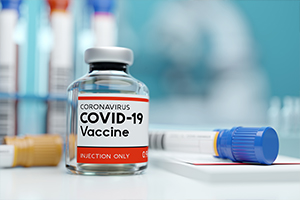Inspirational social care leader Zoë Fry has been awarded the Order of the British Empire (OBE) medal for services rendered to social…
Mandatory vaccinations in care homes - what does that mean for the sector?
A new law which makes COVID-19 vaccines mandatory for employees and workers in care homes has divided opinion, sparked national debate and is now subject to judicial review, but what does this new law mean for a sector which is already reeling from the pandemic and the continuing impact of Brexit?
Following a sector wide consultation in the Spring and the introduction of similar laws across Europe and beyond, in July the government passed the Health and Social Care Act 2008 (Regulated Activities)(Amendment)(Coronavirus) Regulations 2021 into law. The Regulations require all CQC-regulated care homes in England providing accommodation for individuals who need nursing and personal care, to allow entry to the premises, only to those who can evidence that they have received a complete course of an authorised COVID-19 vaccine, unless exempt. This is a very broad requirement capturing all staff (temporary, permanent, agency, volunteers) over the age of 18 as well as adults who need to enter the care home to deliver services (such as tradespeople) or deliver close personal care to the residents (including physiotherapists or hairdressers). There is an annual review built into the legislation, requiring the Secretary of State to consider whether mandatory vaccines remain necessary and whether there would be other means of achieving the policy purpose.
The effect of the Regulations
The obligation and responsibility to implement the Regulations falls to each care home, meaning that checks will have to be made and records kept from the implementation date on 11 November 2021. Failure to do so could lead to claims that the home has failed to provide safe care and treatment, significant fines and even the permanent closure of a home.
The introduction of the Regulations has left little time for care homes to prepare. With the exemptions to this mandatory vaccine requirement being extremely limited, those providers who have not already started conversations with their workforce about needing COVID-19 vaccines are already on the back foot. In order to meet the deadline, workers must have received a first vaccine dose by 16 September 2021.

Exemptions
The list of exemptions is limited. Within the guidance, clinical exemptions will be restricted to individuals who have an allergy or condition that serves as a reason not to administer the vaccine. Visiting family and friends, under 18s, emergency services and people undertaking urgent maintenance work in the care home are also exempt.
However, a last-minute change in policy on 15 September 2021 has introduced a temporary period during which workers are permitted to self-certify that they are exempt from receiving the vaccine. The limited medical grounds for the temporary exemption include examples such as:
What does the future hold?
Despite this, the long-term impact on the sector is uncertain. The Regulations are subject to judicial review on a number of grounds; these include the incompatibility of the Regulations with existing laws that prohibit the enforcement of mandatory vaccines, a failure to consider the efficacy of alternatives to mandatory vaccination, the resultant staffing shortages, the discrimination risks and potential human rights infringements.
However, it is doubtful that the requirement for staff to be vaccinated will be changed, not least because of a new consultation ahead of a planned roll-out to all front-line healthcare workers, including those in the NHS.
In the unlikely event that the Regulations are repealed, there will still be commercial and legal pressures on care homes and healthcare providers to demand that employees are vaccinated. Live in care agency Elder has reported that 63% of customers would feel uncomfortable being looked after by an unvaccinated carer, or having an unvaccinated carer look after a loved one. It is also the case that some employees may feel unsafe if working in an environment they consider to be unsafe. If there is a risk that residents and service users will seek alternative providers, and employees look to work elsewhere, an employer may have little alternative but to mandate vaccines to meet customer and colleague demands.

So, what should a provider be doing now to prepare for the next few months and beyond?
Update employment documents – Ensure job adverts, offer letters, contracts of employment and associated policies and procedures are amended to reflect the requirement that all staff must be vaccinated.
Existing staff – Consider how you will deal with existing unvaccinated staff who remain unwilling to comply with the requirement to be vaccinated. It’s likely that you will need to enter into a period of consultation with each unvaccinated employee and to consider what, if any, alternative work may be available outside of a home.
Consider data protection obligations – Care homes will be required to keep records of vaccination or medical exemption status and will need to ensure that these records are available for inspection by the CQC. Privacy statements for employees and others will also need to be updated.
Contractors – Consider how you will ensure that third parties attending your premises to deliver services, maintenance or personal care are vaccinated; update policies and contracts as necessary.
The next few months and years are likely to remain as tumultuous as they have been for the care sector. Those who prevail will do so with a loyal and dedicated workforce founded on trust and good communication.
Kevin Poulter is a partner in the London office of Freeths LLP and has over 20 years’ experience advising organisations on employee matters. His clients include those in the health, social care and charity sectors. He can be contacted at kevin.poulter@freeths.co.uk and on 07973 882 267.





